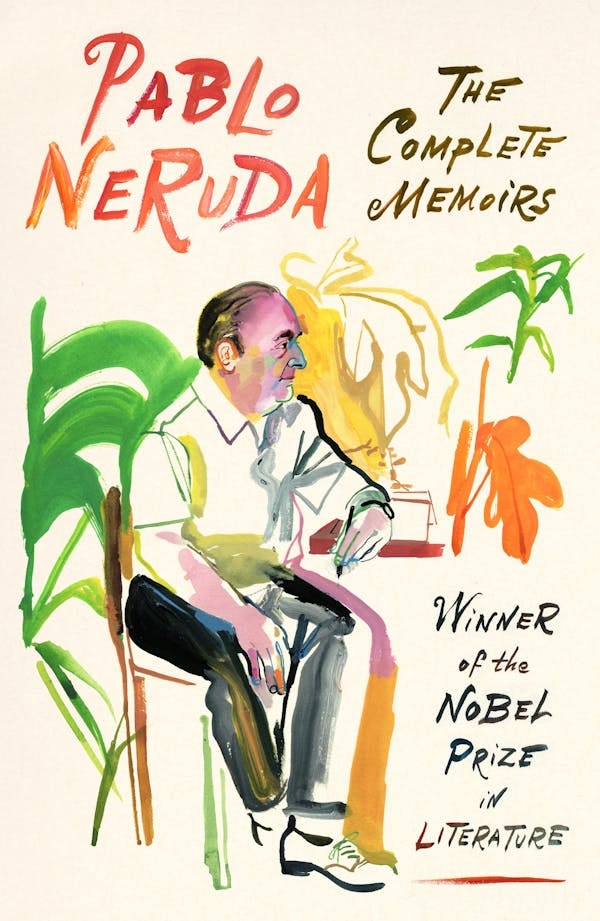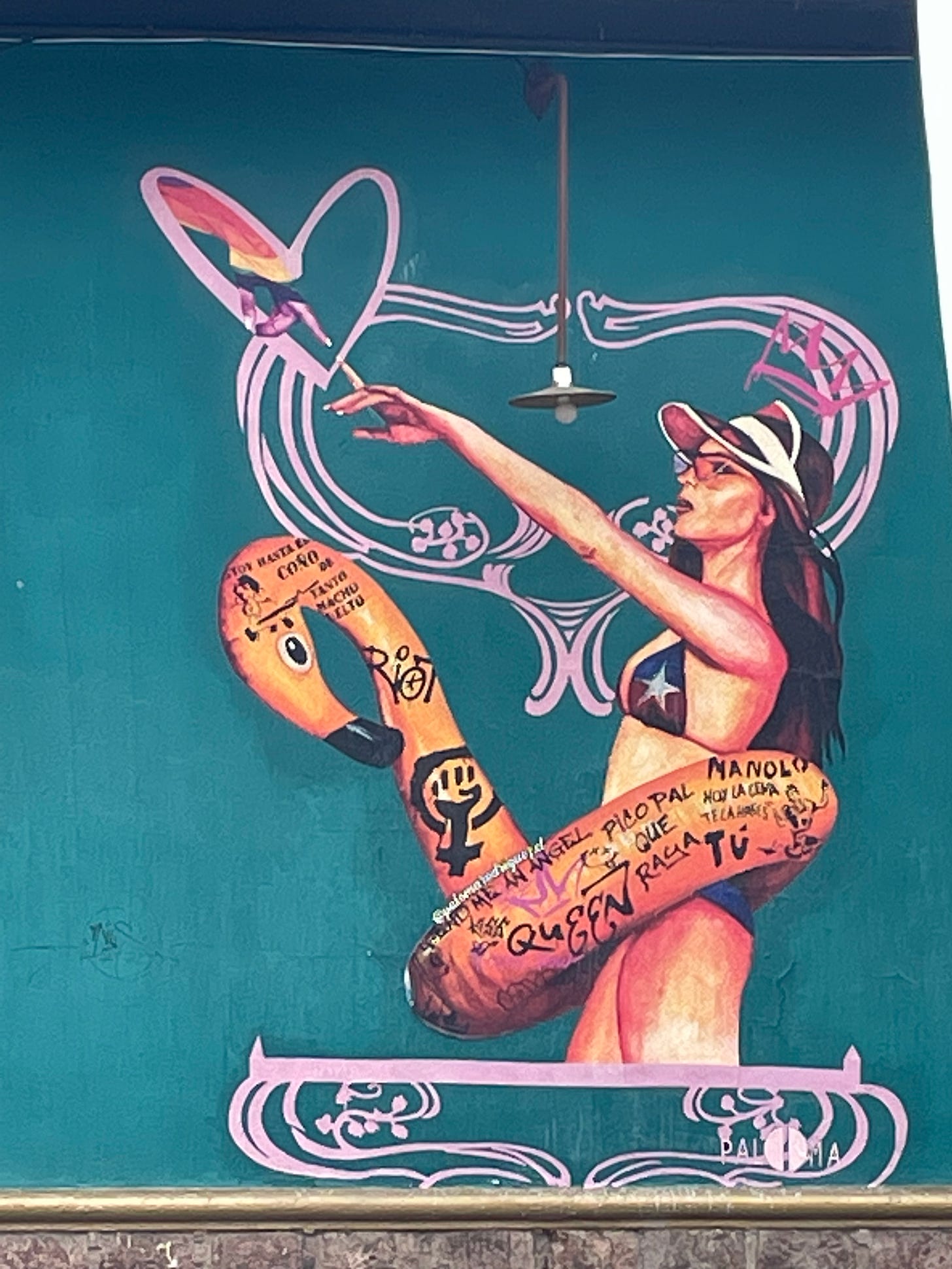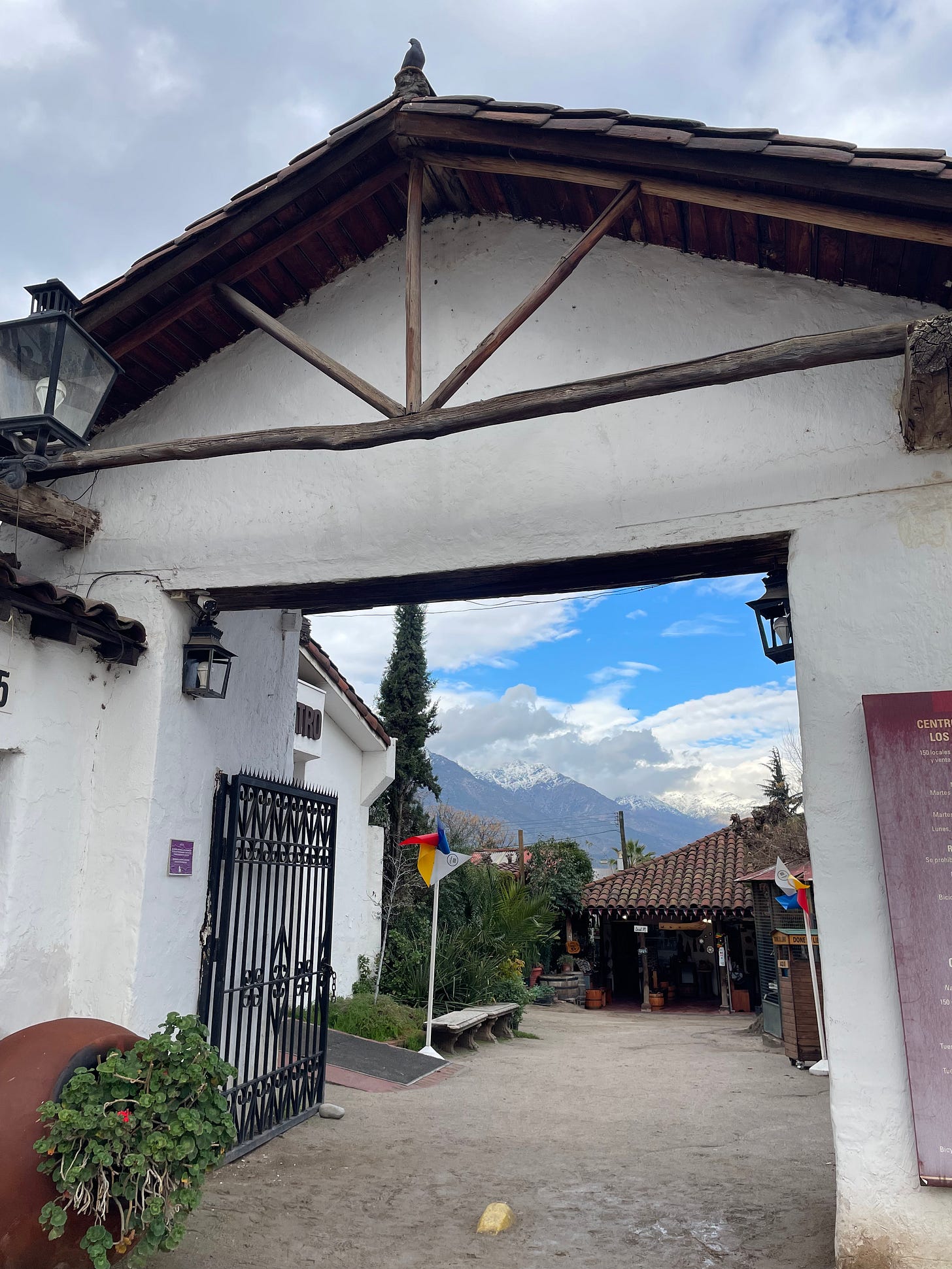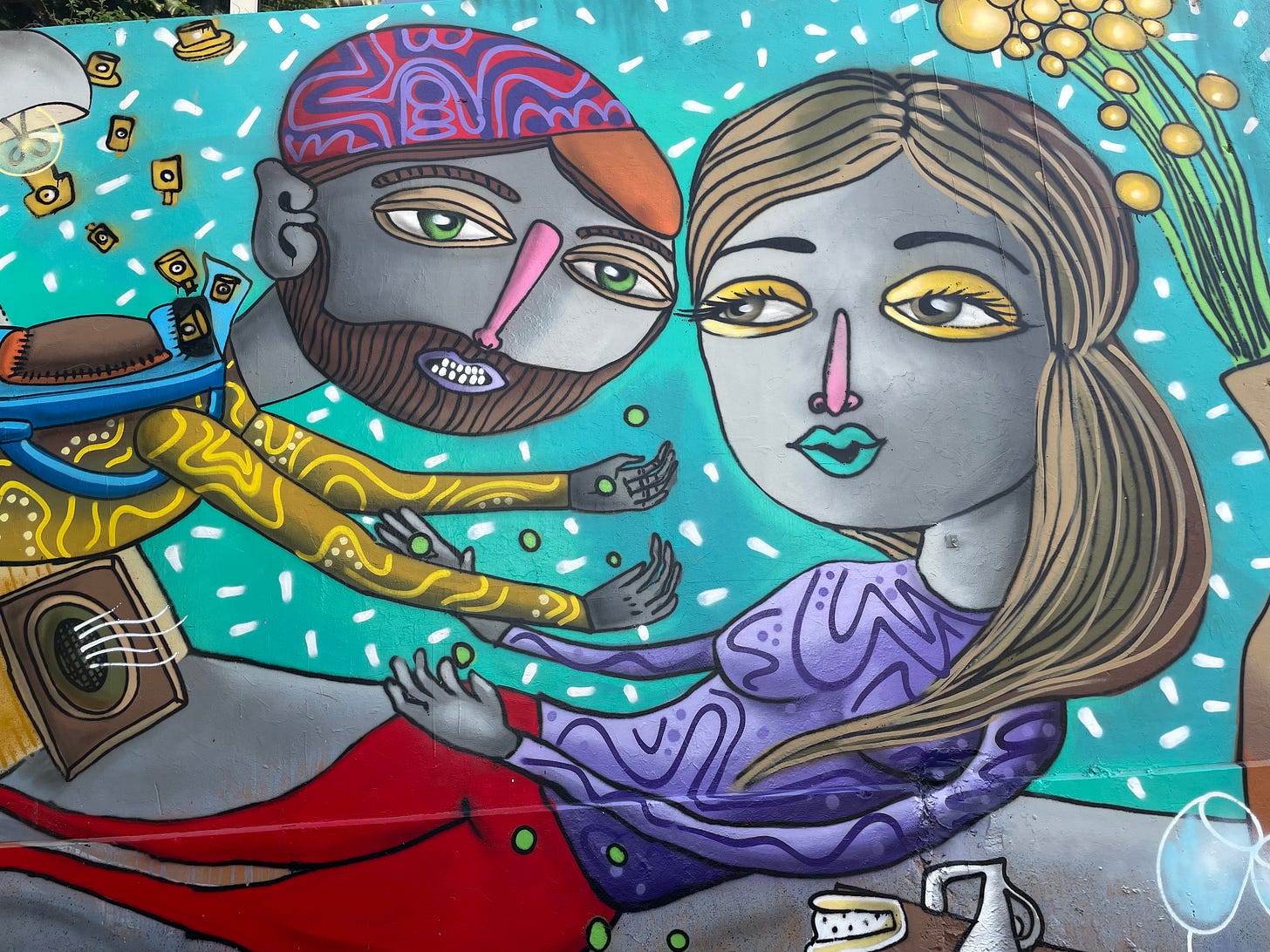PABLO NERUDA AND HIS COMPLETE MEMOIRS
Is it risky to read someone's memoirs before you've attempted to read their body of work? Is it possible to separate the human being from the writer?

I’ve been in Santiago, Chile, all of this week and while no one wants to visit such a place in deep winter I decided that I’d join my husband on his work trip; I told myself that, at the very least, I’d experience the heart of the city and its museums and return home with a little more understanding of this part of the world.
During this visit, I’ve been reading and writing daily as I always tend to do when I’m traveling. For me it’s a way of processing what I learned on a given day. During this last week, I wrote on social media about my three hour walk through the town of Santiago, about the day I went up 62 floors to see the world below Costanero center, and about the day I spent many hours at a museum detailing Chile’s history under dictator Augusto Pinochet.

I was also very keen on a visit to La Chascona. Pablo Neruda’s home in Santiago. One of three properties belonging to the late poet, it is now a museum and is absolutely worth seeing even if one is not familiar with his work. La Chascona is a throwback to the middle of the 20th century, and, if anything, you’ll learn some nuggets about literature and about Chile. I’ve been reading the Nobel laureate’s The Complete Memoirs since last Sunday. It has set my blood pressure surging sometimes; at other times, I’ve been moved by the instinctive responses of a man to the beauty of the natural world around him from the day of his birth.
The first time I stood before the sea, I was overwhelmed. The great ocean unleashed its fury there between two big hills, Huilque and Maule. It wasn’t just the immense snow-crested swells, rising many meters above our heads, but the loud pounding of a gigantic heart, the heartbeat of the universe.
Translated by Hardie St. Martin and Adrian Nathan West, this expanded edition of his memoir has been nothing short of riveting. Neruda lived such a rich life and lived it with so much engagement, braggadocio and courage that it’s impossible to imagine that someone born much later—after the world became so connected—could have managed to create this much art and thought for posterity to enjoy.
Neruda lived and worked in tumultuous times and the evolution of his poetry is a response to the fomenting rebellions around the world—of the end of colonization in the far east, the Spanish civil war, the second world war and, finally, the coup in Chile ten days before Neruda’s death. We follow Neruda on his diplomatic stints in Rangoon, Calcutta, Singapore, Penang, Spain and Brazil.

Clearly Neruda was innately curious. His insatiable thirst for new experiences seemed to put him right in the middle of unpleasant situation and, more often, political chaos. Wherever he went, he also made friends with struggling poets and that, naturally, meant he was surrounded by struggling romantics and the women who fawned over them. The people we meet in these pages are so gifted we begin to wonder why the best of them were often snuffed out so early from the face of the earth .
One friend of Neruda’s in Spain, was a man called Miguel Hernández who was a goatherd, a poet “who emerges from nature like an uncut stone, with the freshness of the forest and an irresistible vitality.” He does not live beyond his 32nd year, and it’s heartrending to watch his enduring love for his muse, the goats of his native Orihuela.
The anecdote Neruda narrates to convey his friend’s passion is intensely moving and it’s doubly so for those of us who chose a career in the arts despite the fact that is not the least bit lucrative or practical in order to conduct a life. Since Miguel had nothing to live on, Neruda took it upon himself to get him a job with his own connections. While it was hard to find a poet a job in Spain, Neruda knew a Viscount, a high official in the Ministry of Foreign Relations who admired Hernandez’s work and was willing to give him any position in his office. To Neruda, it was a dream come true for his friend. Yet, Neruda was unprepared for Hernández’s reaction when he told him that the Viscount wanted to know exactly what sort of job he would like.
Miguel gave it some thought. His face, with its deep premature lines, clouded up with anxiety. Hours went by and it was not until late in the afternoon that he gave me his answer. With the radiant look of someone who has found the solution to his whole life, he said to me: “Could the viscount put me in charge of a flock of goats somewhere near Madrid?”
Moments like this make this book such a powerful account about human beings and their need to make meaning of their allotted time on earth. Neruda’s sensitivity to the plight of his fellow poets and his keen ability to appreciate their extraordinary gifts is central to these pages. On page after page, I find a genuineness and generosity of spirit in Pablo Neruda that is rather rare among artistic beings. I cherished the personal portraits and I know I can never forget this delineation of the late Spanish poet Hernández.
His face was the face of Spain. Chiseled by the light, rutted like a planted field, it had some of the roundness of bread or of earth. Filled with fire, burning in that surface scorched and made leathery by the wind, his eyes were two beams of strength and tenderness.

Yet there are events described in the memoir that have bothered me enough that I’ve wondered if I should even pursue reading the work through to the end. Those of us who have been forged by the fires of the 21st century are much less forgiving that the women who went earlier. More and more, I find myself unable to separate the human being from the writer, thanks to a social movement and awareness campaign against sexual abuse, sexual harassment, and rape culture called #metoo.
In this memoir, Neruda describes his conduct—it’s nothing short of despicable—during his stint in Colombo, when he was inexplicably drawn towards a Tamil woman of the untouchable community. What happens would have sealed his fate in contemporary times in a world roiling under #metoo labels. It has, rightfully, incensed feminists in Chile who would like Neruda’s work to not be taught in schools and universities. A message in graffiti outside his home in Isla Negra, Chile, reads, "Let's not forget that Neruda with his love poems confesses to us that 'anecdote' of rape with impunity.”
In his defense, I will say that Pablo Neruda was honest, at the very least, about the heinous way in which he treated one of his lovers in Burma and the woman in Ceylon. He could have chosen to leave these out of his memoir, after all.
There are several other stories about him that do not paint him in glowing terms. This morning on our tour through Valparaiso, our guide pointed out Neruda’s home up in the hills of this bohemian town. “There…way up there…is his home with the best view of the ocean,“ he said, halting briefly. “He was the biggest womanizer, I tell you.”
Reading The Complete Memoirs behoves me to ask these questions about morals and work. When does a human being ever stop being accountable to the world? When does their personal conduct not spill over and sully their professional image and their integrity?
Neruda’s humanitarian efforts to relocate 2000 Spaniards in Chile has also been written about in this memoir collection. In January of 1939, after three and a half years of a devastating civil war, Francisco Franco defeated Spain’s Republican army at Barcelona. The dictatorship would last nearly fifty years displacing hundreds of thousands of soldiers, activists and Republican supporters.. Pablo Neruda lobbied to save over 2,000 of the refugees, as many as could fit on a nine-ton cargo ship called SS Winnipeg, bound for political asylum.
Rushing up and down, weeping and shouting, they would recognize their dear ones among those putting their heads out the windows in clusters. Everyone eventually got aboard ship. There were fishermen, peasants, laborers, intellectuals, a cross section of strength, heroism, and hard work. My poetry in its struggle, had succeeded in finding them a country. And I was filled with pride.
But do even ten rights erase a wrong?




Brilliant review.
When I was an undergraduate, I most appreciated those artists (that Shakespeare guy, for instance) whose lives were utterly lost while their writing remained as vibrant as ever. Analysis of literature crossed with biography annoyed me, because the great works stand on their own and exist independently from the human being that produced them. Rape is ugly. The poems are beautiful. Welcome to Neruda's beautifugly world, everybody.